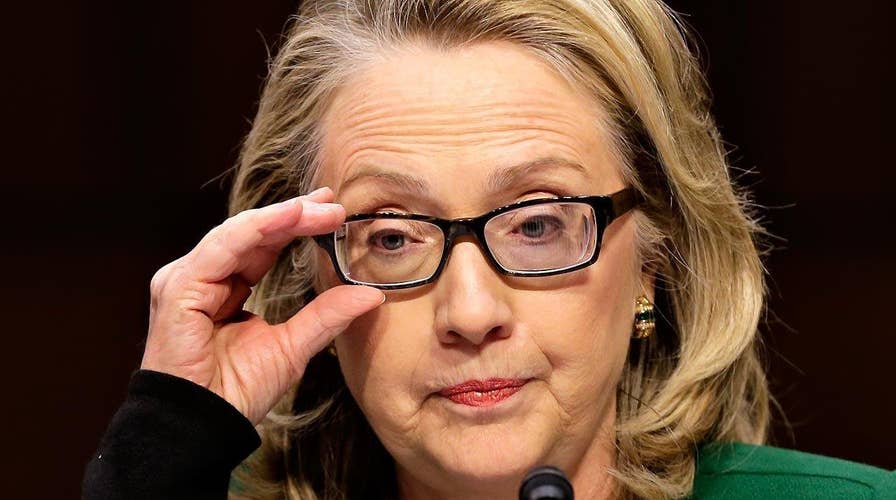Did Clinton Foundation engage State Dept. to help donors?
Correspondent Rich Edson reports on nearly 300 pages of new released work-related emails Secretary Clinton failed to initially surrender to the State Department
A new batch of emails released Tuesday is raising fresh questions about whether Clinton Foundation donors got preferential treatment from the State Department during Hillary Clinton's tenure at the top.
Conservative watchdog Judicial Watch released 44 new email exchanges which it says were not in the original 30,000 handed over to the State Department, despite the Democratic presidential nominee's claims she turned over all work-related emails amid the now-closed probe into her private server use.
The documents, produced as a result of the group's FOIA lawsuit, appear to challenge Clinton's insistence that there is "no connection" between her family foundation and her work at the department.
Though the campaign is downplaying the emails, Republican opponent Donald Trump, at a campaign stop in Virginia on Wednesday, suggested the emails reveal potentially illegal activity.
“It’s called pay for play,” Trump said.
In one email exchange released by Judicial Watch, Doug Band, an executive at the Clinton Foundation, tried to put billionaire donor Gilbert Chagoury -- a convicted money launderer -- in touch with the U.S. ambassador to Lebanon because of the donor’s interests there.
In the email, Band notes that Chagoury is a “key guy there [Lebanon] and to us,” and insists Clinton aide Huma Abedin call Ambassador Jeffrey Feltman to connect him with Chagoury.
Chagoury is a close friend of former President Bill Clinton and has appeared on the Clinton Foundation donor list as a $1 million to $5 million contributor. He’s also pledged $1 billion to the Clinton Global Initiative. Chagoury was convicted in 2000 in Switzerland for money laundering. He cut a deal and agreed to repay $66 million to the Nigerian government.
In another email from April 2009, Band seems to pressure Clinton’s former aides Cheryl Mills and Abedin into hiring a foundation associate.
In the email, Band writes it’s “important to take care of [name redacted].”
Abedin responds, telling Band, “Personnel has been sending him options.”
The latest batch of emails came more than a week after Clinton said, in a "Fox News Sunday" interview, that “there is absolutely no connection between anything that I did as secretary of state and the Clinton Foundation.”
The Republican National Committee seized on the appearance of favor-trading in the latest batch of documents.
“That the Clinton Foundation was calling in favors barely 3 months into Hillary Clinton’s tenure at the State Department is deeply troubling and it is yet another reminder of the conflicts of interest and unethical wheeling and dealing she’d bring to the White House,” spokesman Michael Short said in a statement.
But a Clinton campaign spokesman said: “Neither of these emails involve the Secretary or relate to the Foundation’s work. They are communications between her aides and the President’s personal aide, and indeed the recommendation was for one of the Secretary’s former staffers who was not employed by the Foundation.”
The campaign initially was responding to an account in The Wall Street Journal.
The emails are separate from a larger batch of several thousand work-related emails that FBI officials recovered from Clinton's private server.
Clinton's legal team turned over more than 30,000 emails from her server to the State Department last March but only after deleting another 30,000 messages that Clinton's team deemed private and personal. The FBI plans to turn over the reconstructed Clinton emails to the State Department for public release.
The new Clinton emails also include a February 2009 message to her from Stephen Roach, then-chairman of Morgan Stanley Asia, saying he planned to testify to Congress that week and was "happy to help in any way I can." Roach later met with Clinton over the summer for 30 minutes, according to Clinton calendars obtained by The Associated Press.
In another email, Clinton's chief of staff, Cheryl Mills, informed her that National Security Agency and State Department officials discussed an attempt to develop a modified blackberry for Clinton that might be used when she worked in a restricted State Department office that did not allow private phones.
Clinton called the development "good news," but she continued using a private Blackberry tied to her private server.
The Associated Press contributed to this report.






















